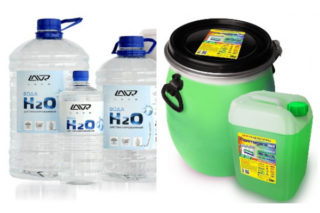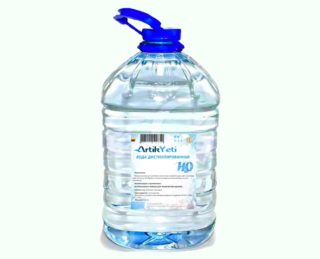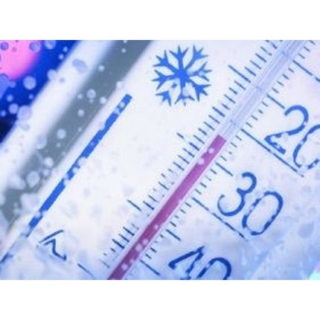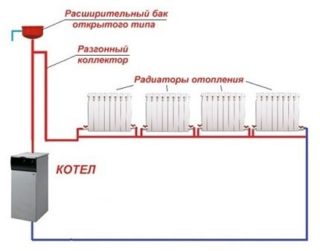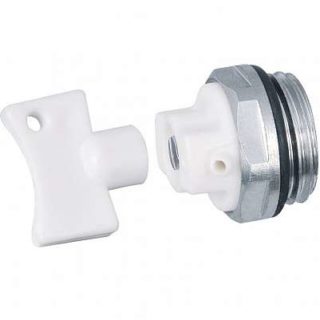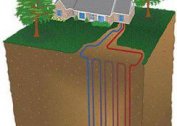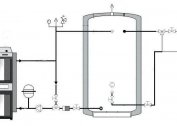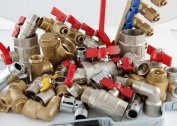For efficient and continuous operation of the heating system, it is important to use high-quality equipment and comply with all operating rules. The coolant for heating also plays an important role in this matter, it must be of excellent quality.
Heat carrier requirements for heating a private house
A heat carrier is a substance that is used to transport heat to batteries from a heating boiler. There are several varieties, each of which has its own individual characteristics, advantages and disadvantages. In most cases, water is used, but to extend the life of the unit, other coolants are often used for the heating system of a country house.
Non-freezing fluid for radiators must meet the following requirements:
- Heat capacity. For a certain amount of time, the maximum amount of heat with minimal losses should be transported through the pipes.
- The latitude of the temperature regime from the boiling point to the freezing point. Between the start and end points, the heating fluid must not lose its technical characteristics.
- Safety for human and animal health. An anti-freeze for heating the house should bring as little harm as possible.
- Inertia. Regardless of the material, the liquid should not provoke the development of corrosion processes.
- Availability and cost effectiveness. If an expensive coolant is used, it must be durable.
- The stability of the chemical and physical composition. When exposed to high temperatures, the coolant for the heating system for the home should not lose its chemical properties - density, viscosity, it is important that the substance does not decompose.
To purchase the most suitable coolant, you need to familiarize yourself with the varieties of liquids and their features.
Types of coolants
In most cases, use water or antifreeze liquid for heating systems. In the first case, it is important to use exclusively completely purified water - distilled. The composition of running water contains a high concentration of various impurities that adversely affect the performance of the system, reducing its operational life.
To calculate the maximum temperature regime of the circulating substance in the heating system, it is important to know the characteristics of the coolant, as well as the existing restrictions on the operation of batteries and pipes. When exposed to heat, the segments of the heating system must not be affected.
Distilled water has the following properties:
- The boiling point reaches 100 degrees Celsius. It is important to note that with increasing pressure, the boiling point also increases. For example, if the pressure is 2.75 atmospheres, the boiling point is already +130 degrees.
- The optimal temperature regime of the coolant in the system reaches +75 degrees. But when the weather changes outside the window, this indicator begins to change. For example, the optimal temperature in steam systems is +120 degrees.
As a coolant, antifreeze deserves special attention.
Non-freezing fluid for heating has the following characteristics:
- It has a low freezing temperature - within -30-60 degrees.
- As part of a large amount of ice-freezer, a substance hazardous to health is contained - ethylene glycol. Well-known manufacturers use a more expensive but safe analogue - propylene glycol.
The main advantage of the substance in comparison with distilled water is its high resistance to low temperatures.
To understand which substance is preferable in a particular case, it is necessary to analyze two liquids.
- Distilled water is safe for health, antifreeze is quite toxic.
- Water has an unlimited service life. Antifreeze can be used no more than five years.
- When overheated, the water does not lose its properties, and the ice-freezer precipitates when foaming. As a result, carbon deposits accumulate on the inner surface of pipes and radiators. After several years, this will have an extremely negative effect on the performance of the entire heating system.
- Different cost. The price of the anti-freeze system is 30-40% more expensive.
- Antifreeze, unlike water, is not combined with all pipes.
For electrode boilers, special non-freezing liquids are used. The composition of such antifreeze contains special components that provide the necessary electrical resistance and electrical conductivity, ionization.
Selection recommendations
If living conditions allow us to guarantee constant maintenance of a positive temperature, it is better to use distilled water, ideally containing surfactants and appropriate inhibitor additives. If financial opportunities do not allow the use of distilled water, it is necessary to carry out activities aimed at softening ordinary tap water.
If housing owners prefer to use antifreeze, it is important to exclude conditions under which it is forbidden to use non-freezing:
- Open type heating system. The inevitable evaporation of the liquid occurs, which will lead to a change in the chemical composition and operational characteristics. In addition, the composition of antifreeze contains components, the release of which can adversely affect the health of households.
- The heating system includes pipes, valves and other parts having a galvanized surface.
- When installing the system, linings are used in linen windings with oil paint. The glycol base in this case is short-lived and quickly “eats” the paint.
- The boiler is not equipped with a sensor that displays temperature conditions. Almost all varieties of antifreeze when heated above 70 degrees begin to decompose and precipitate.
To use antifreeze, it is important to follow a few specific rules:
- When making calculations, it must be taken into account that a more powerful circulation pump and a larger expansion tank are needed. As a rule, the volume of such tanks is several times larger than with water.
- Radiators and pipes should also have more impressive dimensions - internal volume and diameter.
- Automatic air vents are not designed to work with non-freezing liquids. For the removal of accumulated gases you need a Mayevsky crane, manual valves.
- When installing radiators, it is necessary to sort through and install gaskets made of resistant material - Teflon or paronite.
- In threaded connections, it is preferable to use linen tows with additional coating with special sealing paste.
If the house is located in places with favorable climatic conditions, where abnormally low temperatures are rarely observed, it is better to give preference to distilled water.If there is a chance of freezing the system, which will cause a lot of trouble and expense, it is better to use an anti-freeze - a solution of antifreeze.
If you have difficulty choosing before buying, you can consult a consultant in a specialized store, as well as make sure that you have all the documentation confirming the proper quality of the goods.
